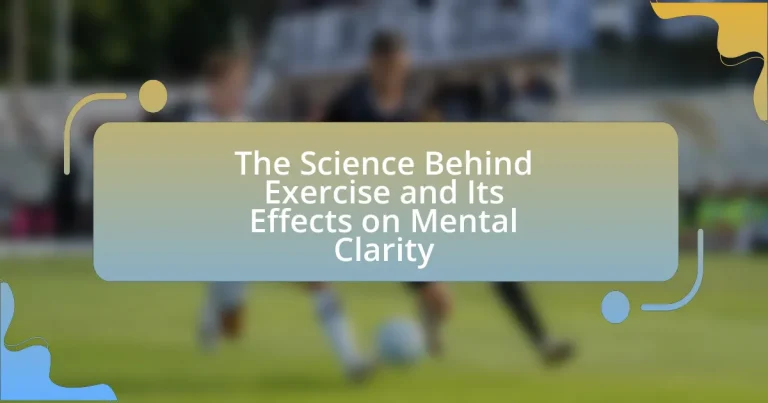The article explores the science behind exercise and its effects on mental clarity, highlighting the physiological and biochemical mechanisms that enhance cognitive functions. It discusses how physical activity increases blood flow to the brain, stimulates neurotransmitter release, and promotes neurogenesis, leading to improved memory, attention, and mood regulation. Key findings from various studies illustrate the importance of aerobic exercises, strength training, and mindfulness practices in enhancing mental clarity and overall well-being. Additionally, the article provides practical tips for incorporating exercise into daily routines to maximize cognitive benefits.

What is the Science Behind Exercise and Its Effects on Mental Clarity?
Exercise enhances mental clarity through various physiological and biochemical mechanisms. Physical activity increases blood flow to the brain, which improves oxygen and nutrient delivery, thereby supporting cognitive functions. Additionally, exercise stimulates the release of neurotransmitters such as endorphins and serotonin, which can enhance mood and cognitive performance. Research published in the journal “Neuroscience & Biobehavioral Reviews” indicates that regular aerobic exercise can lead to structural changes in the brain, including increased hippocampal volume, which is associated with improved memory and learning. Furthermore, a study by Ratey and Loehr in “The Journal of Clinical Psychiatry” highlights that exercise can reduce anxiety and depression, further contributing to enhanced mental clarity.
How does exercise influence brain function?
Exercise enhances brain function by increasing blood flow, which delivers oxygen and nutrients essential for optimal cognitive performance. This increased circulation stimulates the production of neurotrophic factors, such as Brain-Derived Neurotrophic Factor (BDNF), which supports the growth and survival of neurons. Research indicates that regular physical activity can improve memory, attention, and overall cognitive abilities. A study published in the journal “Neuroscience & Biobehavioral Reviews” by Ratey and Loehr (2011) found that exercise can lead to significant improvements in executive function and mood regulation, demonstrating its profound impact on mental clarity and cognitive health.
What physiological changes occur in the brain during exercise?
During exercise, the brain experiences increased blood flow, which enhances the delivery of oxygen and nutrients. This physiological change leads to the release of neurotransmitters such as endorphins, dopamine, and serotonin, which improve mood and cognitive function. Additionally, exercise stimulates the production of brain-derived neurotrophic factor (BDNF), a protein that supports neuron growth and survival, thereby promoting neuroplasticity. Research indicates that regular physical activity can lead to structural changes in the brain, including increased hippocampal volume, which is associated with improved memory and learning capabilities.
How do neurotransmitters affect mental clarity during physical activity?
Neurotransmitters significantly enhance mental clarity during physical activity by facilitating communication between neurons and influencing cognitive functions. For instance, the release of dopamine during exercise improves focus and motivation, while serotonin contributes to mood regulation and overall cognitive performance. Research indicates that physical activity increases the levels of these neurotransmitters, leading to improved attention and mental clarity. A study published in the Journal of Clinical Psychiatry found that regular exercise can elevate serotonin levels, which correlates with enhanced cognitive function and reduced symptoms of anxiety and depression. Thus, the interplay of neurotransmitters during physical activity is crucial for maintaining and improving mental clarity.
Why is mental clarity important for overall well-being?
Mental clarity is crucial for overall well-being because it enhances cognitive function, emotional stability, and decision-making abilities. When individuals experience mental clarity, they can think more clearly, focus better, and manage stress effectively. Research indicates that mental clarity is linked to improved mental health outcomes; for instance, a study published in the Journal of Clinical Psychology found that individuals with higher mental clarity reported lower levels of anxiety and depression. This connection underscores the importance of mental clarity in fostering a balanced and healthy life.
What role does mental clarity play in daily functioning?
Mental clarity significantly enhances daily functioning by improving focus, decision-making, and emotional regulation. When individuals experience mental clarity, they can process information more efficiently, leading to better problem-solving abilities and increased productivity. Research indicates that mental clarity is linked to cognitive performance; for instance, a study published in the journal “Cognitive Psychology” found that individuals with higher mental clarity demonstrated improved attention and memory recall. This cognitive enhancement allows for more effective task management and interpersonal interactions, ultimately contributing to overall well-being and success in daily activities.
How can improved mental clarity enhance productivity?
Improved mental clarity enhances productivity by enabling individuals to focus better, make quicker decisions, and solve problems more effectively. When mental clarity is heightened, cognitive functions such as attention, memory, and reasoning are optimized, allowing for more efficient task completion. Research indicates that regular physical exercise can significantly boost mental clarity by increasing blood flow to the brain and promoting neurogenesis, which enhances cognitive performance. For instance, a study published in the journal “Frontiers in Human Neuroscience” by McMorris et al. (2015) found that exercise improves executive functions, which are crucial for productivity in work and academic settings.

What types of exercise are most effective for enhancing mental clarity?
Aerobic exercises, such as running, cycling, and swimming, are most effective for enhancing mental clarity. These activities increase blood flow to the brain, which can improve cognitive function and mental sharpness. Research published in the journal “Neuroscience & Biobehavioral Reviews” indicates that regular aerobic exercise leads to neurogenesis, the growth of new neurons, particularly in the hippocampus, a region associated with memory and learning. Additionally, high-intensity interval training (HIIT) has been shown to boost executive function and attention, further supporting mental clarity.
How do aerobic exercises impact cognitive function?
Aerobic exercises significantly enhance cognitive function by improving blood flow to the brain, which increases the delivery of oxygen and nutrients essential for brain health. Research indicates that regular aerobic activity, such as running or cycling, promotes neurogenesis, the formation of new neurons, particularly in the hippocampus, a region critical for memory and learning. A study published in the journal “Psychological Science” by McAuley et al. (2011) found that older adults who engaged in aerobic exercise showed improvements in executive function, attention, and memory compared to those who did not exercise. This evidence supports the conclusion that aerobic exercises positively influence cognitive abilities through physiological and neurobiological mechanisms.
What specific benefits do activities like running or cycling provide?
Running and cycling provide numerous benefits, including improved cardiovascular health, enhanced mental clarity, and increased overall fitness. Engaging in these activities strengthens the heart, lowers blood pressure, and improves circulation, which contributes to better oxygen delivery to the brain. Research indicates that aerobic exercises like running and cycling can boost cognitive function and reduce symptoms of anxiety and depression. A study published in the journal “Neuroscience & Biobehavioral Reviews” found that regular aerobic exercise enhances neurogenesis and synaptic plasticity, leading to improved memory and learning capabilities.
How does the intensity of aerobic exercise affect mental clarity?
The intensity of aerobic exercise significantly enhances mental clarity, as higher intensity workouts increase blood flow to the brain, promoting cognitive function. Research indicates that engaging in moderate to high-intensity aerobic activities, such as running or cycling, leads to improved attention, memory, and executive function. A study published in the journal “Neuropsychobiology” found that participants who performed high-intensity interval training exhibited greater improvements in cognitive performance compared to those who engaged in lower intensity exercise. This correlation between aerobic exercise intensity and mental clarity is attributed to the release of neurotrophic factors, which support brain health and cognitive processes.
What role do strength training and flexibility exercises play?
Strength training and flexibility exercises play crucial roles in enhancing physical fitness and overall well-being. Strength training increases muscle mass, improves metabolism, and enhances bone density, which collectively contribute to better physical health and functional capacity. Flexibility exercises, on the other hand, improve the range of motion in joints, reduce the risk of injuries, and enhance overall mobility. Research indicates that regular strength training can lead to a 25-30% increase in muscle strength over a few months, while flexibility training can significantly improve joint function and reduce muscle stiffness. These benefits not only support physical health but also contribute to improved mental clarity by reducing stress and enhancing mood through the release of endorphins during exercise.
How can resistance training contribute to cognitive health?
Resistance training can enhance cognitive health by improving neuroplasticity, which is the brain’s ability to adapt and reorganize itself. Studies have shown that engaging in resistance training increases levels of brain-derived neurotrophic factor (BDNF), a protein that supports neuron growth and survival. For instance, research published in the Journal of Clinical Psychiatry found that older adults who participated in resistance training exhibited significant improvements in executive function and memory compared to those who did not engage in such activities. This evidence underscores the positive impact of resistance training on cognitive functions, particularly in aging populations.
What benefits do yoga and stretching offer for mental clarity?
Yoga and stretching enhance mental clarity by reducing stress and improving focus. These practices promote relaxation through deep breathing and mindfulness, which lowers cortisol levels, a hormone associated with stress. Research published in the Journal of Physical Activity and Health indicates that regular yoga practice can lead to significant improvements in cognitive function and mental clarity. Additionally, stretching increases blood flow to the brain, which can enhance cognitive performance and concentration. Thus, the combination of physical movement and mental focus in yoga and stretching directly contributes to clearer thinking and improved mental acuity.

How can individuals incorporate exercise into their routines for better mental clarity?
Individuals can incorporate exercise into their routines for better mental clarity by engaging in regular physical activity, such as aerobic exercises, strength training, or yoga. Research indicates that aerobic exercise, like running or cycling, increases blood flow to the brain, enhancing cognitive functions and promoting neurogenesis, which is the growth of new neurons. A study published in the journal “Neuropsychobiology” found that individuals who participated in regular aerobic exercise experienced improved attention and executive function. Additionally, incorporating short bouts of exercise throughout the day, such as brisk walking or stretching, can help maintain mental focus and reduce fatigue, further supporting cognitive performance.
What are some effective strategies for maintaining a consistent exercise regimen?
To maintain a consistent exercise regimen, individuals should establish a structured schedule, set specific goals, and track their progress. A structured schedule helps create a routine, making it easier to integrate exercise into daily life. Setting specific, measurable goals, such as exercising three times a week for 30 minutes, provides clear targets to work towards. Tracking progress through journals or apps reinforces commitment and allows individuals to see improvements over time, which can enhance motivation. Research indicates that individuals who set goals and monitor their progress are more likely to adhere to their exercise plans, as demonstrated in a study published in the Journal of Sport and Exercise Psychology, which found that goal-setting significantly improved exercise adherence rates.
How can setting specific goals enhance motivation for exercise?
Setting specific goals enhances motivation for exercise by providing clear targets that individuals can strive to achieve. When goals are well-defined, they create a sense of purpose and direction, making it easier for individuals to track their progress and stay committed. Research indicates that individuals who set specific, measurable goals are more likely to adhere to their exercise routines compared to those with vague or general objectives. For instance, a study published in the Journal of Sport and Exercise Psychology found that participants who set specific goals experienced a 20% increase in exercise adherence over those who did not set specific targets. This demonstrates that specificity in goal-setting not only clarifies expectations but also fosters a greater sense of accomplishment, thereby enhancing overall motivation for exercise.
What role does social support play in sustaining an exercise routine?
Social support significantly enhances the sustainability of an exercise routine by providing motivation, accountability, and emotional encouragement. Research indicates that individuals with strong social support networks are more likely to adhere to their exercise programs, as they experience increased motivation from friends, family, or workout partners. A study published in the Journal of Sport and Exercise Psychology found that participants who engaged in group exercise reported higher levels of enjoyment and commitment, leading to improved adherence rates. Furthermore, social support can mitigate feelings of isolation and stress, which are common barriers to maintaining an exercise routine.
What practical tips can enhance the mental clarity benefits of exercise?
Engaging in regular physical activity can significantly enhance mental clarity, and practical tips to maximize these benefits include incorporating aerobic exercises, maintaining hydration, practicing mindfulness during workouts, and ensuring adequate sleep. Aerobic exercises, such as running or cycling, have been shown to increase blood flow to the brain, which can improve cognitive function and clarity. Research published in the journal “Neuroscience & Biobehavioral Reviews” indicates that aerobic activity promotes neurogenesis, the growth of new neurons, particularly in the hippocampus, a region associated with memory and learning.
Staying hydrated is crucial, as dehydration can impair cognitive performance; studies have demonstrated that even mild dehydration can negatively affect attention and memory. Mindfulness practices, such as focusing on breathing or being present during exercise, can enhance the mental benefits by reducing stress and improving focus. Lastly, adequate sleep is essential for cognitive function; the National Sleep Foundation recommends 7-9 hours of sleep for optimal brain health, as sleep plays a vital role in memory consolidation and mental clarity.
How can mindfulness practices be integrated with physical activity?
Mindfulness practices can be integrated with physical activity by incorporating focused attention and awareness during exercise routines. This integration can be achieved through techniques such as mindful breathing, body scanning, and maintaining present-moment awareness while engaging in physical movements. Research indicates that combining mindfulness with exercise enhances mental clarity, reduces stress, and improves overall well-being. For instance, a study published in the Journal of Clinical Psychology found that participants who practiced mindfulness during physical activity reported greater reductions in anxiety and improved cognitive function compared to those who did not.
What are the best times of day to exercise for optimal mental clarity?
The best times of day to exercise for optimal mental clarity are typically in the morning and late afternoon. Morning exercise has been shown to enhance mood and cognitive function throughout the day, as physical activity increases blood flow to the brain and releases endorphins. A study published in the British Journal of Sports Medicine found that individuals who exercised in the morning reported improved focus and productivity. Late afternoon workouts can also be beneficial, as the body’s temperature and hormone levels peak, potentially leading to better performance and mental sharpness. Research from the Journal of Clinical Psychology indicates that exercising during these times can help reduce stress and improve overall mental clarity.





